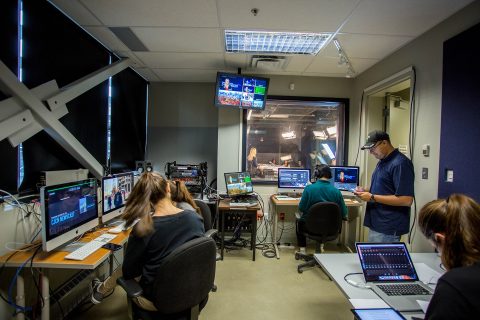Digital Innovation in Journalism Studies (MA)
Program overview
The Digital Innovation in Journalism MA is grounded in both the traditional and contemporary frameworks of journalism studies. It pushes the next generation of researchers—truth seekers, storytellers and catalysts for change—to explore the rapidly evolving digital media landscape.
This one-of-a kind master's program looks into the future of the profession with a unique focus on innovation and new approaches to journalism. Through seminars and lab sessions, you’ll develop critical thinking skills to enhance your understanding of how digital storytelling is redefining traditional mediums such as print, television and radio. Over a two-year period, you’ll gain practical training and a strong research foundation, culminating in a graduate thesis or final essay.
Program structure
Degree Requirements
Fully-qualified candidates are required to complete a minimum of 45 credits.
Please see the Journalism Courses page for course descriptions.
Digital Innovation in Journalism Studies MA (45 credits)
| 9 | credits of Required Courses: |
| 6 | credits of Elective Courses chosen from: With the permission of the department, up to six elective credits may be taken in 600-level courses offered by other departments. |
| 30 | credits chosen from: Digital Innovation in Journalism Studies MA Option A Digital Innovation in Journalism Studies MA Option B Digital Innovation in Journalism Studies MA Option C |
Digital Innovation in Journalism Studies MA Option A
| 6 | credits:
|
| 24 | credits:
|
Digital Innovation in Journalism Studies MA Option B
| 6 | credits:
|
| 24 | credits:
|
Admission requirements
Admission Requirements
- Undergraduate degree with a minimum GPA of 3.00 on a 4.30 scale.
- Proficiency in English. Applicants whose primary language is not English must demonstrate that their knowledge of English is sufficient to pursue graduate studies in their chosen field. Please refer to the English language proficiency page for further information on requirements and exemptions.
Application process
Application deadlines

FALL
February 1 (Canadian resident)
January 15 (International)

WINTER
September 1 (Canadian resident)
June 1 (International)

SUMMER
February 1 (Canadian resident)
October 1 (International)
Priority will be given to complete applications submitted by the deadline. In some cases, programs may continue to accept applications as long as there is space available.
International students: Considering the waiting period involved in meeting the entry requirements to Canada and Quebec, we strongly encourage international applicants to apply early and submit supporting documents prior to the deadline.
Tuition & funding
Tuition and fees
Tuition and fees of the program may depend on your student status, among other key factors. Estimate these costs based on the most common situations.
Awards and funding
Funding packages are generally available for students in thesis-based programs. They come in the form of awards, teaching and research assistantships are offered at the time of admission to most students to allow them to focus on their research and studies. Research and thesis-based students are automatically considered for all entrance graduate awards when they apply to Concordia, provided they meet eligibility criteria. No separate application is required.
The Quebec and Canadian governments offer a number of competitive graduate scholarships. We encourage you to apply for these awards at the same time you are preparing your application.
Out-of-province students
Get up to $9,251 in special funding for master's programs. Learn more
Other programs of interest

Get hands-on experience in print, radio, television and online reporting over an 11-month period from June to April, in a streamlined program that familiarizes you with today's ever changing digital media landscape.
Department
Faculty

Develop the skills required to tell impactful stories through still photography and video. Shoot, edit, and write your own stories in a visually based multimedia practice under the guidance of our faculty.
Department
Faculty


